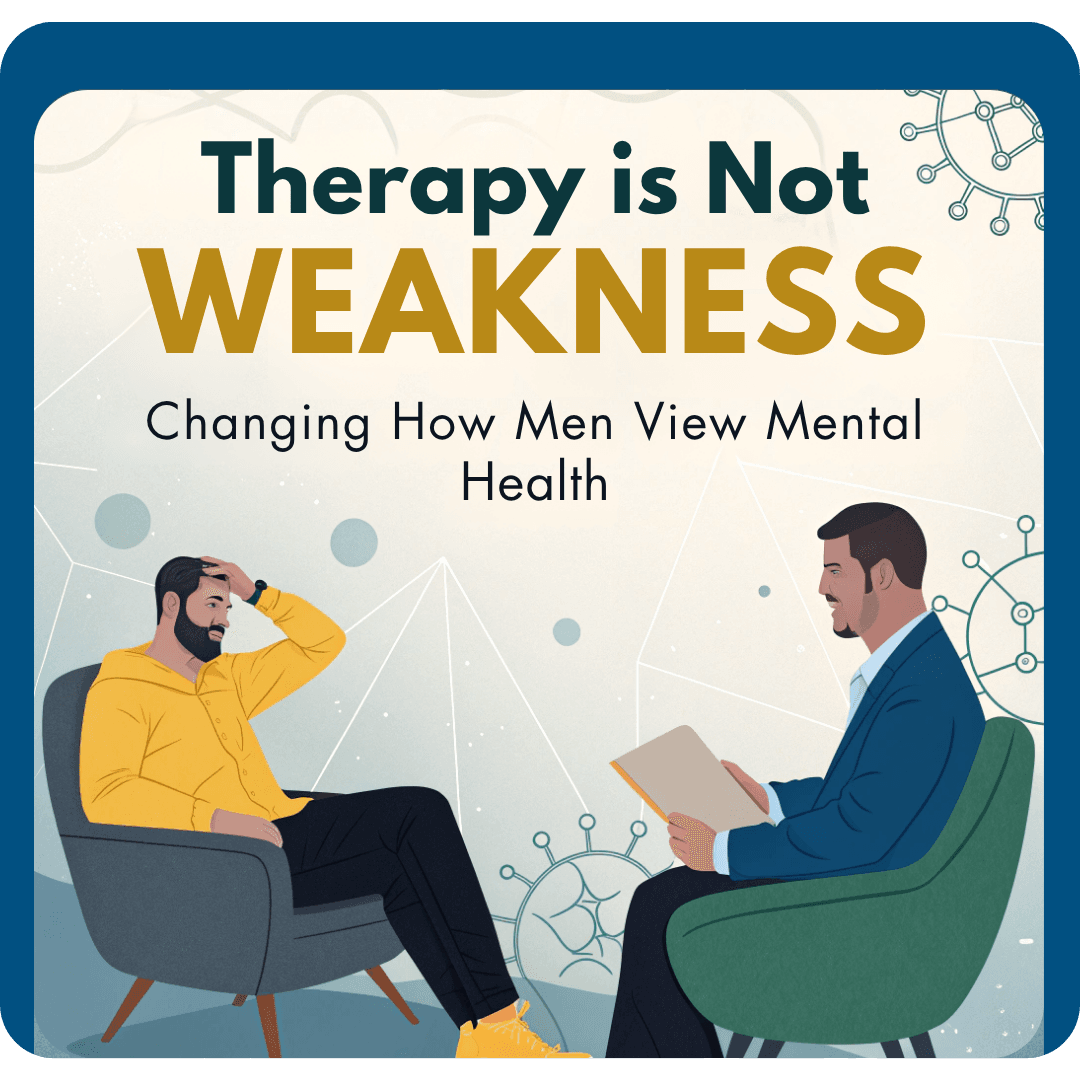Therapy Is Not Weakness: Changing How Men View Mental Health
Table of Contents
Introduction to Therapy for Men
Let’s be honest—if therapy were a gym, most men wouldn’t even peek through the window. Not because they don’t need it (they do), but because many still think “talking about feelings” is like ordering a salad at a steakhouse: weird, awkward, and possibly a threat to their masculinity.
But here’s a truth bomb: real strength is not about suppressing your feelings but having the guts to face them.
Therapy for men isn’t about sobbing into a tissue while Enya plays in the background (although if that’s your thing, no judgment). It’s about clarity. Control. Unloading the mental backpack you didn’t even realize you were carrying.
The Current Reality: Men, Mental Health Stigma, and Therapy for Men
Take Raj, a 34-year-old banker in Mumbai: sharp suits, quicker comebacks. On paper, he had it all. But inside? A mind that felt like a Google Chrome browser with 37 tabs open—and 36 of them frozen.
Like many, Raj believed therapy was for people who were “really messed up.” Not for high-functioning men with full calendars and respectable LinkedIn profiles. Until one day, his body intervened with panic attacks, and he ended up in therapy—not because he was weak, but because he could no longer afford not to.
Men and anxiety are more connected than we talk about. According to the National Mental Health Survey in India (2016), nearly 1 in 5 Indian men suffer from some form of mental distress, but far fewer seek help. Why? Because “I’m fine” is the most dangerous lie men tell themselves.
Why Therapy for Men is a Sign of Strength, Not Weakness
Strength isn’t walking around emotionally constipated.
Strength is having the courage to walk into a therapist’s office and say,
“Okay, let’s unpack why I nearly threw my phone at the wall over a slow Wi-Fi connection.”
Therapy requires bravery. You’re confronting parts of yourself you’ve spent decades ignoring. It’s emotional CrossFit. And let’s face it—male mood swings are real. So is anger in men, often camouflaged as road rage, sarcasm, or suddenly deciding to rewatch Breaking Bad for the 7th time.
Therapy helps you understand the root, not just the reaction.
Common Barriers That Stop Men from Seeking Therapy for Men
- “Therapy is for the weak.”
Nope. Therapy is for the wise. And FYI, your mental health doesn’t care how many pushups you can do.
- “I don’t have time.”
You had time to binge a 10-hour Netflix series, but not 60 minutes to talk about the thing that’s quietly ruining your sleep?
- “I should be able to fix this myself.”
Let’s get this straight—you hire a mechanic for your car and a barber for your hair. Why not a therapist for your brain?
- “What will people think?”
Imagine choosing suffering over someone else’s opinion. That’s like refusing to drink water because someone might say you’re thirsty.
Benefits of Therapy for Men
Here’s what therapy can do for men:
- Improve self-awareness and emotional intelligence
- Help manage anger in men before it explodes (and ruins date night)
- Reduce anxiety for men without needing to become a monk
- Improve communication in relationships (read: fewer fights, more understanding)
- Boost clarity in decision-making—because no, overthinking isn’t a personality trait
- Teach regulation techniques that help with male mood swings
Imagine being able to walk into a meeting, a date, or a difficult conversation feeling centered instead of ready to either implode or ghost. That’s the power of therapy.
Real-Life Success Stories of Therapy for Men
Kanan, 29, used to think therapy was “overrated fluff.” But after struggling silently with sleeplessness and emotional numbness, he reluctantly attended a session.
“I didn’t cry. I didn’t talk about my mom. I just felt… seen. And for once, not judged for being human.”
Aman, 41, had explosive anger issues. After three months of therapy, his wife noticed something:
“You don’t scream anymore when the coffee’s cold.”
Even celebrities are speaking up.
Actor Ranveer Singh opened up about his struggles with depression, saying therapy was “a turning point” in helping him reclaim his life and emotional balance (NDTV, 2015).
Conclusion: The Importance of Normalizing Therapy for Men
The truth is simple: Mental health isn’t a gender issue. It’s a human one.
Men have been taught to armor up, to tough it out. But therapy isn’t about breaking you down—it’s about setting you free. From rage, you don’t understand. From sadness you’ve buried. From the pressure you silently carry.
Therapy for men is not a threat to masculinity—it’s the upgrade it’s been waiting for.
If you’re reading this and thinking, “Maybe I should try therapy,” the answer is: Yes. Book the damn session.
Your future self will thank you.
🧠 Ready to talk to someone? Explore therapy for men at The Healing Room? Because strong men ask for help. And the bravest thing you can do… is feel.
References (Chicago Style):
NDTV. “Ranveer Singh Opens Up About His Battle With Depression.” NDTV.com. October 2015. https://www.ndtv.com
National Institute of Mental Health and Neurosciences. National Mental Health Survey of India 2015-16. Ministry of Health and Family Welfare, Government of India.
Because of societal pressure to appear strong, fear of being judged, or feeling that asking for help means weakness.
Yes. Therapy is about healing and growth, not weakness. Acknowledging emotions is a sign of emotional strength.
Action-oriented and practical therapies like CBT, solution-focused therapy, or approaches that combine talk + tools tend to feel more comfortable.
It varies person to person. Some feel relief in a few sessions; for others it takes more time. Consistency helps.
Yes, totally normal. But gradually, when you experience the support and changes, that worry reduces.
Talking helps, but therapy gives you a safe space, trained guidance, and tools to deal with deeper beliefs and patterns.
It shouldn’t, especially if confidentiality is maintained. Many people find therapy improves performance, relationships, and self-confidence, which can help professionally too.
Look for someone with experience working with men’s issues, one whose style feels right to you (direct, empathetic, action-oriented etc.), and don’t hesitate to try a few until you feel comfortable.
Not at all. Therapy is for growth, healing, and becoming your best self, not fixing brokenness.
Admitting you need help, researching therapists, talking it out with someone trusted, reading or hearing stories of men who’ve benefited—it all helps reduce stigma.





Such an important read. Therapy for men needs to be talked about more often—and without shame. Your message about breaking the stigma is powerful and long overdue.
This blog on Therapy for Men is so needed in today’s world. Breaking the mental health stigma is not just brave—it’s life-saving. Thank you for creating a safe space to talk about these issues.
I found this post on therapy for men incredibly insightful. It’s encouraging to see stigma around men’s mental health addressed so thoughtfully. The idea that seeking therapy is a sign of emotional strength—not weakness—really resonates. I hope more articles like this continue to normalize conversations about therapy for men and help break down those outdated stereotypes.
Beautifully written! The way you explain how stigma stops so many from embracing therapy for men is eye‑opening. I especially liked the real‑life examples—helpful for anyone who still feels hesitant about therapy.